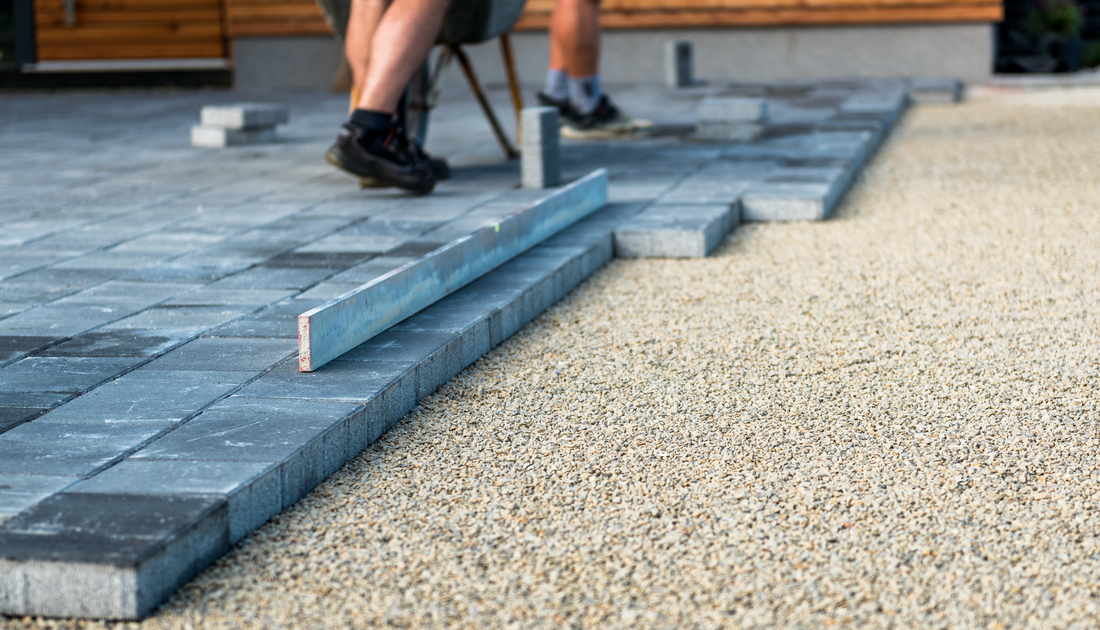
Best Materials for DIY Driveway Paving Projects
Share
Thinking about laying your own DIY driveway?
Good on ya! Picking the right material is key—get it wrong, and you’ll be cursing it every time you drive in. Whether you’re after something budget-friendly, long-lasting, or just easy to DIY, here’s a rundown of the best options and a few tips to make sure you don’t end up with a driveway that’s more trouble than it’s worth.
Things to Consider Before Choosing a Driveway Material
Before you get stuck in, have a think about these:
DIY Driveway on a Budget
Are you going for the cheapest option, or do you have a bit extra in case something goes pear-shaped?
Weather & Drainage
If you’re in a wet area, poor drainage can turn your driveway into a swamp. And if you’re in the outback, heat-resistant materials are a must.

Maintenance
How much upkeep are you willing to do? Some materials need regular top-ups, others are more set-and-forget.
DIY Driveway-Friendliness
Some DIY driveways are easy enough, while others are best left to the pros. Oh, and if you’re tackling a gravel grid paving project, we’ve got a step-by-step DIY manual and videos to help you get it done right the first time.
We shape our buildings: Thereafter, they shape us. — Winston Churchill
Gravel DIY Driveways: Budget-Friendly & Easy
Gravel’s a ripper option if you’re after something cheap and simple. It’s quick to lay, drains well, and is easy to top up when needed. Just keep in mind—it can shift over time, and if you don’t compact it properly, you’ll be battling potholes.
Pros: Cheap, easy to install, great for drainage
Cons: Can get messy, needs occasional top-ups
Best for: Rural or temporary driveways

Concrete Driveways: Tough as Nails & Long-Lasting
Concrete is solid as a rock (literally). It gives you a smooth, durable finish that’ll last for years, but it’s not the cheapest option, and if you’re DIYing, you’ll need to get your mix and curing process bang on. Otherwise, you might end up with cracks.
Pros: Strong, low maintenance, customisable finishes
Cons: Pricey upfront, not the easiest for DIYers
Best for: Permanent, high-traffic driveways

Asphalt Driveways: A Solid Middle-Ground Option
Asphalt’s a good shout if you want something tougher than gravel but cheaper than concrete. It holds up well in cooler climates, but in the Aussie heat, it can soften, so you might need to reseal it now and then.
Pros: Affordable, quick to install, flexible
Cons: Needs sealing, struggles in extreme heat
Best for: Homes in cooler areas with moderate traffic

Paver DIY Driveways: Looks Schmick, But Takes Some Skill
If you’re after a driveway that looks top-notch, pavers are the way to go. You can mix up colours and patterns to match your home, plus they’re easy to repair if one cracks. Just be ready to put in the work—laying them takes patience and a solid base.
Pros: Stylish, long-lasting, easy to repair
Cons: More expensive, takes time to lay properly
Best for: High-end or decorative driveways

Permeable Geo Grid DIY Driveways: The Eco-Friendly Choice
Want something tough, low-maintenance, and good for the environment? Permeable geo grids are a beauty. They let water drain through (so no more pooling or erosion), and they’re strong enough for heavy vehicles. A bit more effort to install, but worth it in the long run.
Pros: Stops erosion, reduces runoff, durable
Cons: Needs proper prep work for best results
Best for: Eco-conscious homeowners, areas with drainage issues

Brick Driveways: Timeless but Pricey
Bricks look fantastic and can last a lifetime if laid right. They’re easy to repair if one cracks, but they’re not exactly budget-friendly, and unless you’ve got some solid bricklaying skills, getting them straight and level is a mission.
Pros: Classic style, durable, easy to fix
Cons: Expensive, tricky to DIY properly
Best for: Historic homes or high-end designs

Crushed Stone DIY Driveways: Rustic & Natural
Similar to gravel but with a bit more character, crushed stone gives you a natural, country-style driveway. It’s easy to spread, drains well, and looks great, but you’ll need to top it up occasionally as it shifts.
Pros: Budget-friendly, good drainage, custom look
Cons: Moves over time, needs refilling
Best for: Country homes, larger properties
[Crushed stone driveway guide]

Recycled Materials: Budget & Eco-Friendly
If sustainability’s your thing, using recycled crushed concrete or reclaimed asphalt is a top choice. It’s cheaper than new materials and just as tough, though availability can be hit or miss.
Pros: Good for the planet, affordable, durable
Cons: Supply can be limited, needs compacting
Best for: Budget-conscious, eco-friendly homeowners
Did you know our standard EzyHex grids are made from 100% recycled materials—so you’re not just saving cash, you’re doing your bit for the planet too?

Which DIY Driveway Material is Best for You?
There’s no one-size-fits-all answer—it all comes down to your budget, how much work you’re willing to put in, and what kind of look you’re after. Whether it’s a simple gravel job, a tough-as-nails concrete slab, or an eco-friendly grid system, choosing the right material now will save you a headache (and extra costs) down the track.
A DIY driveway is a top way to boost your home’s value while saving a few bucks. Get it right, and you’ll have a driveway that not only looks great but holds up for years to come.
Got questions or need a hand? Get in touch for a Free Quote Today!
